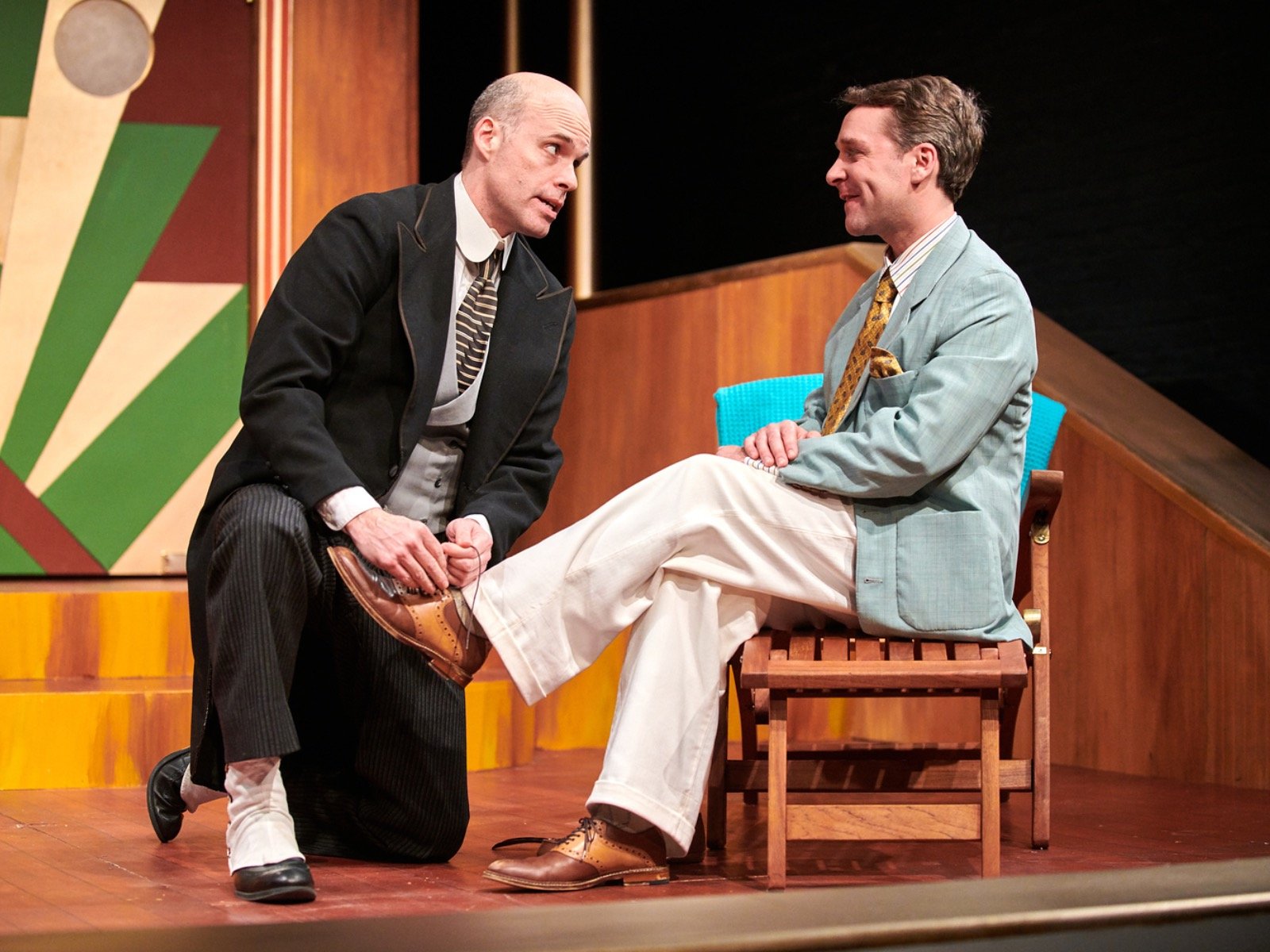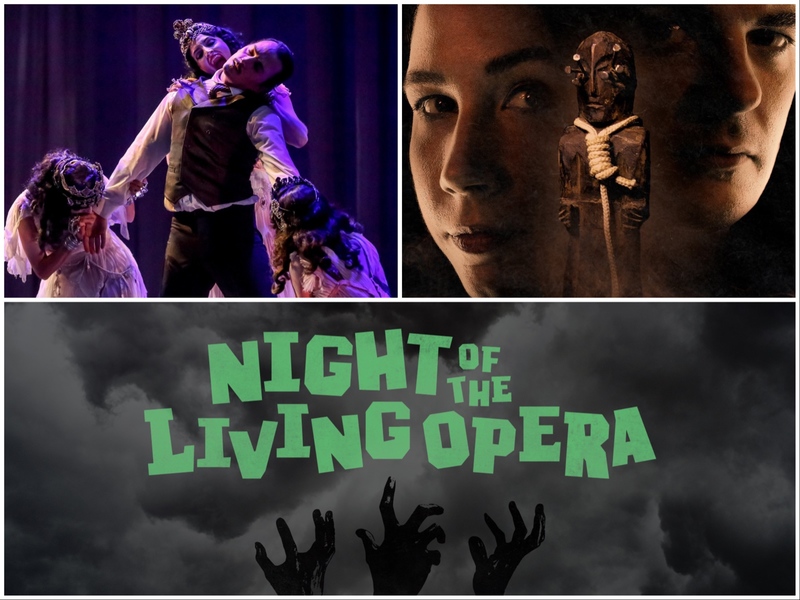"Bingo, bungo, bang!" and "Toodle pip!" P.G. Wodehouse’s famous duo Jeeves and Bertie are back in town and onstage in the Studio Theatre in Milwaukee Chamber Theatre’s "Jeeves at Sea," through Dec. 22.
The last production C. Michael Wright will helm as the company’s producing artistic director, "Jeeves" is an elegant English Christmas cracker, an inconsequential but mildly amusing farce dressed up in beautiful wrapping that will temporarily distract audiences from any real-world concerns. English novelist Evelyn Waugh summed up the appeal of the stuffy, genius butler and his buffoonish charge saying, "Mr. Wodehouse’s idyllic world can never stale. He will continue to release future generations from captivity that may be more irksome than our own. He has made a world for us to live in and delight in."
Out of the Cabot, and instead staged in the more intimate black box space, this is MCT’s fourth iteration of the uber-efficient butler and his foolish playboy charge, adapted by Margaret Raether. For fans of the previous shows, there is good news: The original pair of lead actors is back.
With impish charm and the frivolity of those blue-blooded English chaps to the manor born, Chris Klopatek is an adorable Bertie, untouched by serious worldly troubles but constantly in a "deuce of a pickle" of his own making. And Matt Daniels is Jeeves, the relentlessly even-tempered, stiff-upper-lipped manservant. His only purpose in life is to feed and dress Bertie immaculately, provide encyclopedic knowledge on anything the gadabout encounters and devise ingenious rescue plans for each of his master’s missteps that inevitably land him "in the soup." Proper as a crisply starched collar and nimble as a ballet dancer, Daniels is delightfully unflappable.
In this adventure, aboard a yacht in Monaco Harbor, Bertie is accompanying his friend Sir Percival "Crumpet" Crumpworth (Josh Krause), another trust fund baby, on the search for another fortune to inherit. Also on board is the lovely and lithe Lady Stella (Kathryn Hausman), a charming young lady who is "awfully full of beans and buck," according to Bertie. Both of the idle rich bachelors are taken with her, going to great lengths to impress the society girl, her prudish chaperone Miss Pilbeam (Diane Lane) and the young woman’s father, who is against his daughter marrying below her titled class.
Interrupting their episodes of "pitching woo," their morning restoratives, afternoon teas, cocktail hours, formal dinners and general drunken carrying on, is the news that a prince was mysteriously assaulted nearby. Now his attaché, the goose-stepping, uber-German Count Otto Von Dietrichstein (Michael Stebbins) has arrived. With an accent, costume, and mannerisms straight out of a World War I propaganda music hall sketch, he demands to see Crumpet, who may have left a tell-tale article of clothing at the scene of the crime.
In the ensuing silliness, one character pretends to be his own twin brother, newly arrived from "darkest Africa." One poses as the true author of a series of bodice-ripping romance novels, featuring true love above and below one’s station.
There is lots of hiding in closets, quick exits and entrances, an unlikely romantic reunion, a duel, and a genuinely impressive finale packed with physical comedy and stage combat. A host of last minute reversals restores everyone to their right place in this fantastical world – the dreamy life of leisure in the 1920s for the last generation of English noble wealth.
As Crumpet, Krause is a natural sad sack, worrying to distraction about how to recover his inheritance from a long lost uncle and concerned that, in an alcohol infused stupor, he may have caused an international incident. With a graceful gait and a perfectly tailored striped jumpsuit, Hausman’s Lady Stella looks like she truly belongs to another time period. She is wiser and more self-assured than the typical love interest, complete with a knowing smirk that she’s manipulating those around her for her own amusement. As the dowdy matron Miss Pilbeam, who rediscovers her girlish sensibilities, Lane’s fawning over a lost love veers to the syrupy sweet but ultimately gives the audience hope for delayed happy endings.
As with Christmas crackers (and every season of "Downton Abbey") "Jeeves" is visually stunning. Stephen Hudson-Mairet has designed a sumptuous yacht with rich, dark wood and Art Deco flourishes of geometric design and gold trim. Costumes by Kim Instenes give the characters an effortless elegance true to the period – particularly Bertie and Stella, who look like they should be on their way to a chic garden party. As Bertie would say, it’s "the genuine Tabasco!"
Verbally, the production is also notable. Like the plays of George Bernard Shaw and Oscar Wilde, Wodehouse’s characters speak a very particular version of English. "Jeeves" delights in odd similes and metaphors, and incorporates (or invents) all kinds of slang. The fact that the entire cast has mastered this peculiar dialect and delivers it with ease is impressive and entertaining.
Other tropes of the period don’t age as well. Crumpet boasts of derring-do as the ultimate white colonial power, a big game hunter in Africa, and there are cartoony caricatures of other nationalities. And both female characters swoon at the thought of men fighting a duel for their honor. These things aren’t quaint relics; they’re cringeworthy. As the ultimate arbiter of good taste, Jeeves would agree that it’s time to abandon such "wooly-headed duckiness."







